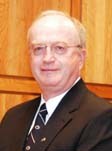B.S. Forestry, 1973, M.S. Forest Resources 1974

Darrel L. Williams
Darrel L. Williams received his B.S. degree in Forest Science in 1973 and his M.S. degree in Forest Resources in 1974, both from the School of Forest Resources at Penn State. His master's thesis, under major professor Dr. Brian Turner, focused on computer analysis and mapping of gypsy moth defoliation in Pennsylvania using data from a new satellite program called the Earth Resources Technology Satellite, later renamed Landsat. He was recruited to NASA immediately following attainment of his M.S. degree. While at Penn State he was a member and two-year resident of the Alpha Zeta fraternity -- the national agricultural and biological sciences honorary fraternity. He was also a member of Xi Sigma Pi, the national forestry honorary fraternity. He later earned a Ph.D. in Physical Geography from the University of Maryland in 1989.
Williams currently serves as the Associate Chief in the Hydrospheric and Biospheric Sciences Laboratory at NASA's Goddard Space Flight Center in Greenbelt, Maryland. He continues to serve as the Landsat Project Scientist, a position he has held since 1992. In this position he was responsible for ensuring the scientific integrity of the Landsat 5 and 7 missions currently in orbit. Williams also serves as the project manager for NASA's LBA-ECO project in Brazil that is focused on better understanding the effects of large-scale tropical deforestation on continental and global weather systems. Prior to his selection as Associate Chief, Williams served as head of the Biospheric Sciences Branch from 1991 through 2001. He began his NASA service in 1975 as a research scientist in that same organization.
Williams served as assistant project scientist for Landsat 4 and 5 during the late 1970s and early 1980s, and as the EOS Deputy Project Scientist during 1989-90. He has authored and coauthored more than 70 publications in the field of quantitative remote sensing. In 1991 he was named an adjunct professor at the University of Maryland, Department of Geography.
Williams has received well over two-dozen NASA awards in a variety of categories. Foremost among these are the NASA Medal for Outstanding Leadership (1997) and NASA's Exceptional Service Medal (2000). He has also received awards from external organizations such as the U.S. Department of Agriculture and the American Society of Photogrammetry. He received the Aviation Week and Space Technology 1999 Laurels Award for outstanding achievement in the field of space in recognition of his science leadership role for the highly successful Landsat 7 mission.
Williams' remote sensing research involved the development of enhanced quantitative techniques for assessing forest canopy conditions. Landsat imagery depicting some of these techniques are on display in the "Looking at Earth from Space" room at the Smithsonian's Air and Space Museum, with acknowledgment to Williams.
In 2002, Williams was recruited by the government of Australia to serve as an expert reviewer of Australia's National Carbon Accounting System, which was developed to conduct continental-scale assessments of carbon stocks (that is, forests) in Australia using Landsat data.
Williams served as a member of the editorial board of the International Journal of Remote Sensing from 1990 through 1998, and has also served on the editorial board of the International Journal of Photogrammetry and Remote Sensing. Williams has served as NASA science officer for several sponsored research projects at Penn State, including projects of Dr. Wayne Myers in the School of Forest Resources. He has served on the advisory board for Penn State's Environmental Resources Research Institute (now Penn State Institutes of the Environment).
Williams has served his community as a member of the Queen Anne School board for six years, and has coached several youth sports teams. In 2000, he was invited by his high school alma mater, Punxsutawney Area Senior High School, to give the commencement address to the first graduates of the new millennium.
Department of Ecosystem Science and Management
- Office 814-865-7541
- Fax 814-865-3725
Department of Ecosystem Science and Management
- Office 814-865-7541
- Fax 814-865-3725

